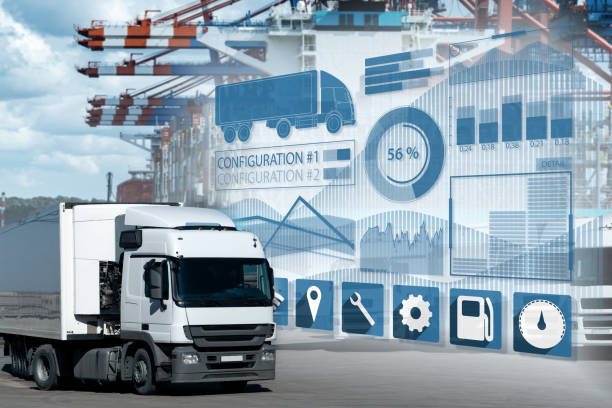
This article delves into the advancements in modern fleet management technologies, which aim to improve efficiency, reduce costs, and promote sustainability in transportation.
Fleet management has evolved significantly over time, from manual processes to advanced technologies like GPS tracking. Today, fleet management is data-driven, utilizing artificial intelligence, machine learning, and IoT devices to provide detailed insights into vehicle performance, driver behavior, and route optimization. This shift from reactive to proactive management is crucial for businesses to meet complex logistical demands and improve operational efficiency.
Modern fleet management systems utilize real-time tracking using GPS and IoT technologies to monitor vehicles in real-time, ensuring timely deliveries, optimizing routes, and maintaining driver accountability. This data aids in decision-making, allowing managers to quickly reroute vehicles if a vehicle is stuck in traffic. Additionally, real-time tracking alerts ensure compliance with regulatory standards and internal policies, ultimately improving operational efficiency and customer satisfaction.
Predictive maintenance is a revolutionary approach in fleet management that uses data from various sensors to predict component failures, allowing for optimal scheduling and minimizing operational disruptions. This preemptive approach extends vehicle lifespan, ensures parts are replaced before significant damage occurs, and enhances fleet safety and reliability. By leveraging advanced analytics, fleet managers can maintain vehicles in optimal condition without guesswork and inefficiencies, thereby enhancing fleet safety.
Optimizing routes is crucial for efficient fleet operations. Advanced fleet management systems use sophisticated algorithms to determine the most efficient routes for each vehicle based on real-time data. Factors like traffic conditions, delivery windows, and fuel costs are all taken into account. This level of optimization not only saves fuel and reduces wear and tear on vehicles, but it also improves delivery times and customer satisfaction. Route optimization tools can provide drivers with turn-by-turn directions, and managers can easily adapt routes to account for any new variables, such as road closures or urgent deliveries. This dynamic approach ensures that fleets operate at peak efficiency, reducing both operational costs and environmental impact.
Considering the human element, enhanced driver management is a core component of modern fleet operations. Technology tools enable fleet managers to monitor driver behavior in real-time, including metrics such as speed, braking patterns, and idle time. This data helps in identifying areas where drivers can improve their performance, and targeted training programs can be implemented to address these issues. Additionally, some systems offer gamification features that reward drivers for maintaining optimal performance, thus incentivizing good driving habits. Enhanced driver management not only leads to better fuel efficiency and reduced vehicle wear and tear but also improves safety on the roads. Ensuring that drivers are well-trained and motivated ultimately leads to more reliable and efficient fleet operations.
Fuel costs are a substantial part of any fleet operation’s expenses. Consequently, efficient fuel management is crucial for maintaining profitability. Modern fleet management solutions offer sophisticated fuel management systems that track fuel consumption at a granular level. By analyzing this data, managers can identify inefficiencies and take corrective actions, such as optimizing routes, maintaining proper tire pressure, or adopting better driving practices. Additionally, fuel cards integrated with the management system can provide detailed reports on fuel use, preventing unauthorized fueling and aiding in expense management. These systems also allow for the monitoring of fuel prices to determine the most cost-effective times and locations to refuel. Overall, advanced fuel management systems play a vital role in reducing operational costs and enhancing efficiency.
In today's competitive market, customer service can make or break a business. Fleet management solutions significantly enhance customer service by offering more reliable and timely deliveries. Real-time tracking allows customers to receive accurate updates on their shipments, reducing uncertainty. Moreover, route optimization ensures that deliveries are made within the expected timeframes, thus boosting customer satisfaction. Predictive maintenance also plays a role by reducing the risk of vehicle breakdowns, which can lead to delayed shipments. Additionally, advanced reporting tools help managers quickly resolve any issues that may arise, further improving the customer experience. By leveraging these advanced tools, companies can offer a level of service that sets them apart from the competition.
Sustainability is becoming increasingly important in fleet management. Many modern solutions include features designed to minimize the environmental impact of fleets. Route optimization and driver behavior analytics can significantly reduce fuel consumption and greenhouse gas emissions. Additionally, predictive maintenance ensures that vehicles operate efficiently, lowering their environmental footprint. Some fleet management systems also offer the ability to monitor and report on emissions, providing valuable data for regulatory compliance and sustainability initiatives. Electric and hybrid vehicles can also be integrated into these systems, enabling managers to track their performance metrics. By adopting these technologies, fleet operations can not only reduce costs but also contribute to environmental sustainability, aligning with modern corporate social responsibility goals.
The future of fleet management looks promising with several emerging trends on the horizon. Autonomous vehicles are gaining traction, promising to further revolutionize the industry by eliminating the need for human drivers. While fully autonomous fleets are still some years away, semi-autonomous features like adaptive cruise control and lane-keeping assist are already being integrated into modern vehicles. Additionally, the rise of connected vehicles will lead to even more data being available for analysis, providing deeper insights into every aspect of fleet operations. Blockchain technology also shows potential for improving supply chain transparency and enhancing data security. These innovations, coupled with continuous advancements in AI and machine learning, are set to make fleet management more efficient, reliable, and sustainable than ever before.